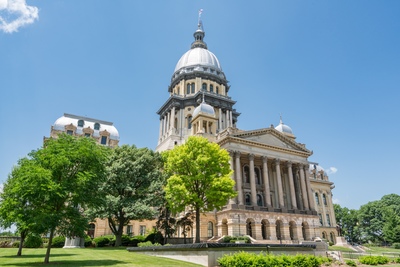
Energy & Environment
How Small Modular Reactor Laws Are Reshaping State Nuclear Energy Policy
January 23, 2026 | David Shonerd
October 31, 2023 | Matt Crawley

Key Takeaways:
This article is part of our latest series: Major Issue Trends in 2023: State Legislative Recap. In this series, our experts examine the high-level legislative trends they saw in the 2023 state sessions. In addition to discussing the most prevalent issues considered by state policymakers, they explore some of the more surprising emerging trends we noticed, plus what to expect in 2024 for many of these policy areas. The series will be released during November and December, with new articles each week. Explore the full series here, and be sure to sign up for our email list so you don’t miss out on any articles (check the “Blog Posts” box).

In Illinois, the final version of SB 1555 created the Statewide Recycling Needs Assessment Advisory Council to provide a report to the legislature by Dec. 31, 2025, regarding end-of-life management for packaging and paper products. The council will include representatives of the waste, recycling, and packaging industries and the study will encompass all types of packaging material, assess the current state of their recyclability within the existing recycling infrastructure, and make recommendations for improving recycling rates for plastic packaging products up to 65% by 2035. The final version of the bill differs starkly from its introduced version, which had established an EPR program before undergoing multiple amendments.
In a similar fashion, Maryland passed SB 222, which initially established an EPR program, but was later reduced in scope to an EPR study bill. Specifically, the bill requires the Office of Recycling to hire an independent consultant to conduct a statewide recycling needs assessment and report its findings to the legislature by July 30, 2024. The bill also requires the creation of a producer responsibility organization by October 1, 2023, and an attached advisory council, which shall include representatives from the recycling industry and “material-oriented trade groups.”
We have also closely monitored the progress of active packaging EPR bills in California and Massachusetts. While California already has a packaging EPR law on the books, lawmakers introduced two bills (CA SB 303 and CA AB 1526) aimed at amending the standards surrounding dispute resolution, fees, and adding producer requirements for expanded curbside collection and worker protections. Massachusetts meanwhile has introduced a number of bills that either create a packaging EPR program or mandate a study. As Massachusetts has a two-year session, no bill has made it beyond its chamber of origin and no significant movement is expected to happen in the near future.
Connecticut and New York were close to passing plastic packaging EPR bills this session, with last-minute amendments removing relevant provisions from CT HB 6664 and the New York state budget (NY SB 4008/NY AB 3008). New York also failed to pass either of the bills (NY AB 5322/NY SB 4246) that took up the issue after its omission from the budget. These failures came despite state commitments by Governors Lamont and Hochul at the start of the session and were surprising given the Democratic trifecta status of both state legislatures. Similarly, bills in the trifecta states of Washington and Hawaii that were expected to pass floundered as the session progressed, and compromise eluded lawmakers.
Even Oregon, a Democratic trifecta that already has packaging EPR laws on the books, failed to pass a bill aimed at toughening recycling standards. The bill (OR HB 2871) would have prohibited sales of packaging, beverage containers, and other products from being labeled recyclable unless listed as suitable for recycling collection in Oregon by the Environmental Quality Commission (EQC), and labeled with a recyclability claim that conforms to EQC standards, which the bill would have required the EQC to develop. Despite seemingly favorable conditions, the bill died in committee.
In examining these policy failures, it appears that even in states with Democratic trifectas — the states most likely to pursue and successfully pass EPR legislation — the complexity of the issues involved and the implications for local governments as well as corporations make packaging EPR bills prone to intense security, sometimes to the point of impracticality and gridlock.
However, one interpretation of these failures could be that as stakeholders continue to educate lawmakers on the nuances of this issue, the proposals they put forward develop in tandem with their understanding. While a hindrance in 2023, this commitment to accounting for the variant complexity present in such an enormous issue could produce a political consensus in a later session. In any case, we’re confident that the political will to pursue and enact such bills in these states will remain intact in 2024.
This year was on par with the 2022 legislative session, which saw two packaging EPR bills enacted in Colorado and California out of 40 considered across 19 states. We expect this activity level to continue in 2024 and will be paying close attention to Connecticut, New York, Massachusetts, California, and Minnesota.
Currently, there is a campaign on the parts of three Minnesota counties and the Product Stewardship Institute (PSI) to develop a draft packaging EPR bill for introduction during the 2024 legislative session. The draft as currently written would include such features as the creation of a producer responsibility organization (PRO), an advisory board, the execution of a needs assessment, and the creation of a state covered materials list. Minnesota is a Democratic trifecta, and by traditional logic would be a friendly place for such an introduction. But as we have seen, infighting and disputes over language can sometimes prove too much even when the players are all listed as being on the same team.
While the majority of these states have become reliable proponents of packaging EPR bills, most notably those more progressive legislatures in the Northeast and Northwest (e.g., CT, NY, OR) this year’s introduction of bills in Tennessee and North Carolina illustrate the issue is not totally confined to blue states. While none of these bills made it past their chamber of origin, recent bill activity in red states on other, closely-related issues does show a willingness to tackle problems relating to recycling infrastructure. For that reason, we’ll be keeping an eye on those states as well.
While packaging is at the top of the list for most lawmakers, last year’s session saw increased interest in bills that sought to create EPR programs for a broader range of products, including paint, carpets, and mattresses. In total, the scope of 2023 EPR legislation encompassed over 100 bills in 24 states. We expect this issue to attract similar attention in 2024 as public support for sustainability policies continues to grow, particularly in regard to the waste management industry.
MultiState’s team is actively identifying and tracking EPR issues so that businesses and organizations have the information they need to navigate and effectively engage with emerging laws and regulations. If your organization would like to further track EPR or other related environmental issues, please contact us.

January 23, 2026 | David Shonerd

January 22, 2026 | Daniel Kampf

October 27, 2025 | Billy Culleton